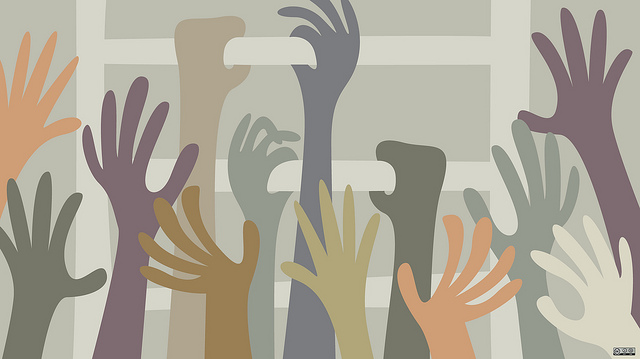We have come to accept that collateral damage is a necessary cost of war.
Even the smartest of bombs are imperfect, and despite our best intentions, bullets find more than just soldiers. In increasingly urbanized conflicts around the globe, fought in people’s homes and schools and houses of worship, the bodies that stack up rarely wear uniforms.
We despise this fact, but we accept it. Yet, when it comes to helping people, through social programs, public aid, or immigration assistance, we demand a much higher level of precision. And as these contentious subjects make their way into the public discourse, it appears that many people are unwilling to accept that sometimes the unintended will benefit so that our targets may thrive. In a strange and inhuman double standard, there seems to be a war against collateral assistance.
We have all heard the stories of the guy picking up his welfare check while driving a Mercedes. We’ve read about the inner-city mother who buys beer with cash and bread with food stamps. We’ve watched news clips about meth addicts on unemployment while workers take drug tests. And these anomalies—and they are most assuredly anomalies—offend us so deeply that we demand sweeping cuts and expensive regulation.
And it’s not that our demand for justice is unreasonable. What’s unreasonable is how specifically we single out unfairness. In reality, I don’t want government contractors to overcharge the military for toilets or tanks or torpedoes. But I know it happens. And I am willing to accept it because a perfect system is unattainable. I am willing to accept that some rich guy with the right friends and the right lobbyists will pad his pockets at the cost of the taxpayers. I even accept that he may sell us a few extra $8-million tanks that we don’t really need.
Perhaps most strangely, I tolerate such graft even though that same amount of money could massively benefit thousands of people on public assistance, most of whom want a hand up, not a hand out. But for some reason, a few dozen elites draining public funds seems smaller than a few thousand misuses of welfare, even though the economic cost of the former is exponentially larger than the latter.
From an emotional standpoint, our distaste for the abuse of public assistance makes absolute sense. We don’t want to help those who don’t deserve it. This misuse is, undeniably, an injustice. We want our aid to be targeted and well executed. We want only the deserving to benefit. Yet, we make these demands while simultaneously knowing that war is imperfect and kills well beyond its intentions.
For example, we know air strikes against ISIS inevitably cost non-combatants their lives. We know innocent Afghanis have been caught in crossfire. We know Iraqi civilians have died—165,000 of them in fact—so we could topple a single dictator.
That number is admittedly hard to grasp, so let’s say it is the equivalent of everyone you have ever known, met, or heard of suddenly ceasing to exist. That’s your brothers, sisters, aunts, uncles, grandparents, first cousins, second cousins, and fifteenth cousins—times 10,000—dying in a fire. That is everyone you have ever sat next to on the subway, passed in an airport, or seen on a TV who, from one moment to the next, took a breath and then they didn’t.
And we accept that. Because that’s the cost of justice.
But we do not apply this logic across the board. We’re increasingly not applying it to public assistance. And the reason why is that we are rationalizing death but emotionalizing life. And if that’s the case, our tragedy scale is clearly broken. We have accepted the costs of war, but are fighting the costs of peace.
The thing is, the welfare guy in the Mercedes should piss us off. None of us want the undeserving to get public aid. But none of us want the innocent to die in an air strike either. So when it comes to assistance, are we really willing to punish hundreds of thousands of innocent people so that we can mete out justice to a few? I guess that’s up to us each individually.
But if our answer is yes, then that raises some further questions. In fact, if collateral damage is acceptable but collateral assistance is not, then we as a nation have lost something infinitely more valuable than money.
~
Relephant Read:
Amnesty, Immigration & the Arrogance of Citizenship.
Entitlement & Lazy Racism. {Adult}
~
Author: Dane Phillips
Editor: Alli Sarazen
Photo: Opensource.com/Flickr







Read 2 comments and reply